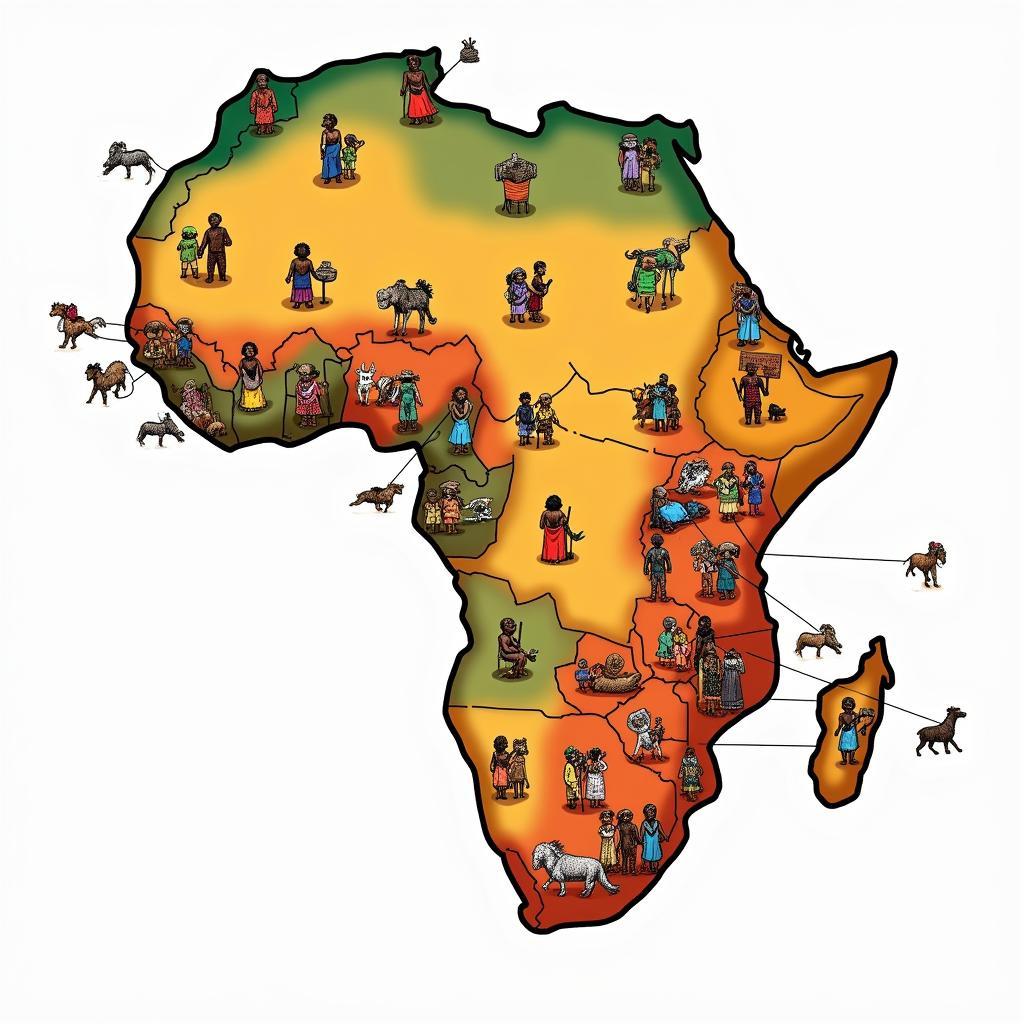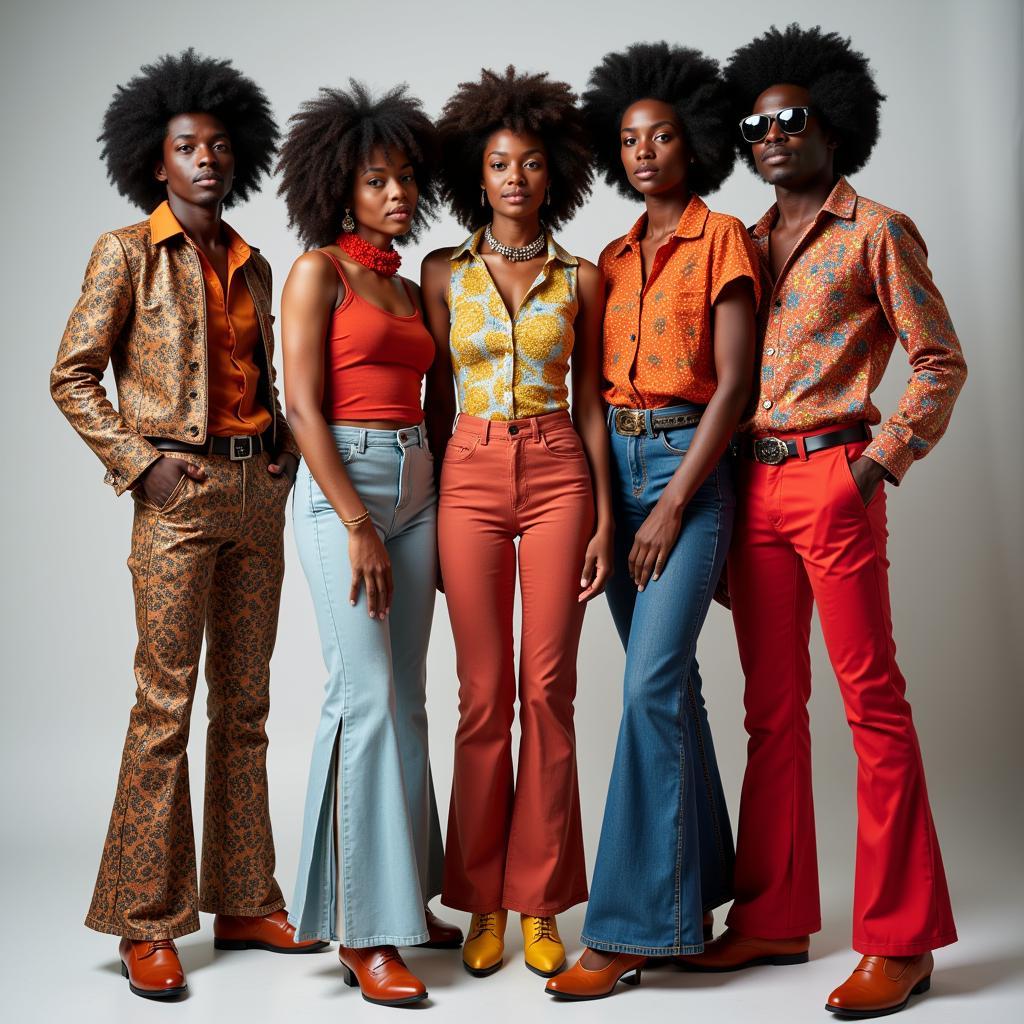Exploring the Rich Tapestry of African Tribes Culture
Africa, the second-largest and second-most populous continent, boasts a captivating tapestry of cultures, each more diverse and intricate than the last. Within this vast expanse, thousands of distinct African tribes contribute to a cultural heritage as ancient as it is vibrant. This article delves into the fascinating world of African Tribes Culture, exploring their traditions, art forms, beliefs, and the challenges they face in the modern world.
The Diversity of African Tribes
It is crucial to acknowledge the immense diversity within the continent. To speak of a singular “African tribe culture” would be a gross oversimplification. From the Berber people of North Africa to the San people of Southern Africa, each tribe has carved its own unique identity, shaped by its environment, history, and social structures.
 Map of African Tribes
Map of African Tribes
For instance, the nomadic pastoralist traditions of the Maasai in Kenya and Tanzania, famed for their intricate beadwork and lion hunting ceremonies, contrast sharply with the settled agricultural practices of the Yoruba people in Nigeria, known for their elaborate masquerades and rich oral traditions.
Language and Communication
Language is a cornerstone of any culture, and Africa is no exception. With over 2,000 languages spoken across the continent, communication styles are incredibly diverse. While some tribes communicate in languages with millions of speakers, others maintain unique dialects spoken by only a few thousand. This linguistic diversity is a testament to the rich tapestry of African cultures.
 African Tribe Storytelling
African Tribe Storytelling
Social Structures and Governance
African tribes culture often centers around strong family and community bonds. Many tribes adhere to patriarchal structures where elders hold significant authority, while others practice matrilineal systems where lineage and inheritance are passed down through the female line. For instance, the Akan people of Ghana are known for their matrilineal system, where chieftaincy and property are passed down through the mother’s lineage.
Art, Music, and Storytelling: Expressions of Cultural Identity
Art serves as a vibrant expression of cultural identity within African tribes. From the intricate wood carvings of the Makonde people in Tanzania to the colorful Ndebele house paintings in South Africa, artistic traditions are deeply intertwined with spiritual beliefs, social values, and daily life.
The Power of Music and Dance
Music and dance hold a central place in the lives of many African tribes. Rhythmic drumming, melodic vocals, and energetic dances accompany important ceremonies, celebrations, and rituals. For example, the energetic polyrhythmic drumming and trance-inducing dances of the Yoruba people are integral to their religious practices and social gatherings.
Storytelling: Preserving History and Tradition
Oral traditions, passed down through generations, are vital to preserving history, beliefs, and social norms within African tribes. Elders, revered as keepers of wisdom, share captivating stories, myths, and proverbs that serve to educate, entertain, and instill moral values.
 African Tribal Mask
African Tribal Mask
Challenges Facing African Tribes in the Modern World
While African tribes culture remains remarkably resilient, many face challenges in the face of modernization, globalization, and social change.
Loss of Traditional Lands and Practices
The encroachment of modern society often threatens traditional ways of life. Loss of land due to development projects, deforestation, and climate change forces many tribes to adapt their traditional practices or face displacement.
Cultural Preservation and Revitalization
Despite the challenges, there is growing awareness of the importance of preserving African tribes culture. Many tribes are actively working to document their languages, traditions, and art forms. Initiatives focused on cultural tourism and sustainable development offer avenues for economic empowerment while preserving cultural heritage.
Conclusion
Exploring the vast and varied world of African tribes culture is a journey of discovery, unveiling the beauty, complexity, and resilience of these ancient communities. From their art and music to their social structures and spiritual beliefs, African tribes offer a unique window into the diverse tapestry of human experience. As we strive to understand and appreciate the richness of African cultures, we must also acknowledge the challenges they face and support their efforts to preserve their heritage for generations to come.
FAQ
What are some of the most well-known African tribes?
Some of the most well-known African tribes include the Maasai, Yoruba, Zulu, Himba, San, and Tuareg, each with their unique customs and traditions.
How do African tribes adapt to modern life while preserving their culture?
Many tribes are finding ways to balance tradition with modernity, engaging in sustainable tourism, documenting their languages, and incorporating modern practices while upholding their core values.
How can I learn more about specific African tribes?
Resources like online cultural platforms, documentaries, and ethnographic museums offer valuable insights into the diverse cultures of African tribes. It’s also enriching to engage with ethical travel experiences that allow respectful interaction with local communities.
Need More Information?
For further insights into the captivating world of African tribes culture, explore these related articles:
- African Forest Tribes Paragraph
- African Javelin Crossword
- African Face Paint Boys
- African Desert List
- African Genderfluid
Contact us at +255768904061, kaka.mag@gmail.com, or visit us at Mbarali DC Mawindi, Kangaga, Tanzania. Our dedicated team is available 24/7 to assist you.



